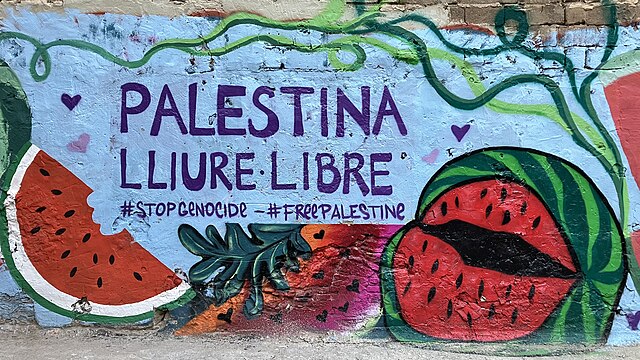 Photo Credit: B. de los Arcos
Photo Credit: B. de los Arcos
By Dalia Zein
Postdoctoral Research Fellow, Geographies of Coloniality and Everyday Violence Research Group (GOCEP), Tampere University, dalia.zein@tuni.fi
In the summer of 2025, the International Animal Rights Conference (IARC) organizing committee issued a statement prior to its upcoming conference in September 2025, responding to calls for its boycott. The statement refuted claims at their attempt to silence Palestinian voices, explaining that the reason why they refrained from posting images of animal rights activists wearing keffiyehs at their 2024 event on their social media platform was:
based on the fact that, in Germany, [the organizing team is located in Germany and Luxembourg] keffiyehs have at times been used by individuals or groups advocating the destruction of Israel. We want to stress that we do not believe everyone wearing a keffiyeh holds such views; rather, we were concerned about the symbol being misinterpreted.
(IARC, 2025)
The committee, mentioning in the statement their opposition to the ongoing violence and oppression in Gaza carried out by the Israeli government, refrained from using the terminology of genocide or settler-colonial violence.
Focusing solely on the critique of the mass slaughter of trillions of aquatic animals and billions of land animals yearly while ignoring the extreme violence and erasure that Palestinians, and Gazans especially, continue to be subjected to by the Israeli settler colonial state, is not an isolated incident. The case of IARC rather points to the failure of the mainstream vegan movement to uphold its values of equality, compassion, and liberation beyond non-human animals.
Why do most vegan organizations continue to be silent about the genocide? One of the answers to this question can be found in Vegans for Palestine’s advocacy, a group that was founded shortly after the beginning of the ongoing genocide in Gaza by Palestinian vegans, as well as allies from the region and beyond, such as Iran and Lebanon. Vegans for Palestine supports the Boycott, Divestment, and Sanctions (BDS) movement, drawing parallels between the importance of boycotting animal products and Israeli products, as well as the boycotting of vegan companies that are complicit in genocide. Most importantly, the group explores the systemic reasons behind why vegan mainstream spaces have been largely quiet face-to-face with Israeli war crimes, calling out the predominant lack of reflection on the whiteness of vegan mainstream spaces, and their failure to hold Israel’s vegan-washing accountable. Attempting to appeal to ‘liberal Western values’ especially among younger generations, Israel has been attempting to brand itself for over a decade as the vegan and LGBT capital of the region, going as far as investing in vegan meals and leather boots for the Israeli Defense Forces, reinforcing their self-portrayal as ‘the most moral army in the world’. As Dalal from Vegans for Palestine pointed out, “veganism for Israel is a moral shield instead of a moral compass” (Vegans For Palestine 2025).
The reluctance of (most) animal liberation activists to talk about intersecting issues (in fear of decentering the animal cause) misses the complex interlocking of these oppressions. If animals are at the center of factory farming exploitation, this violence does not exist in a vacuum. I contend that the social sciences can act as a platform where strategies of the animal liberation movement can be unpacked and reconsidered, leading to a more direct engagement with intersectional and decolonial thought. If working collectively against Israel’s vegan washing, calling for the end of the genocide, and the dismantling of a settler colonial state is one of the most pressing matters at the moment, veganism must always be situated within how other systems of subjugation normalize oppression. Animal exploitation is just as normalized as the objectification of women’s bodies (Adams, 2015), and workers, often migrants or refugees with no prospects for alternative livelihoods, face violent working conditions in factory farms, farms that take over and destroy ecosystems and indigenous farming and culinary traditions. By centering conversations around how speciesism is reinforced by patriarchal, colonial, and capitalist domination, we do not abandon animal liberation but rather grasp a more nuanced vision of what it takes for this liberation to happen.
References
Adams, Carol J. 2015. The Sexual Politics of Meat: A Feminist-Vegetarian Critical Theory. Anv edition. New York: Bloomsbury Academic.
IARC. 2025. “Statement Regarding the Accusation of Silencing the Free Gaza Protests.” International Animal Rights Conference 2025. Accessed on August 18, 2025.
Vegans For Palestine. 2025. Vegans for Palestine Podcast – Episode 04 – Rejecting Isr@el’s Genocidal “Vegan Revolution.” Accessed on August 18, 2025.
Resources for Supporting Vegan Initiatives in Gaza